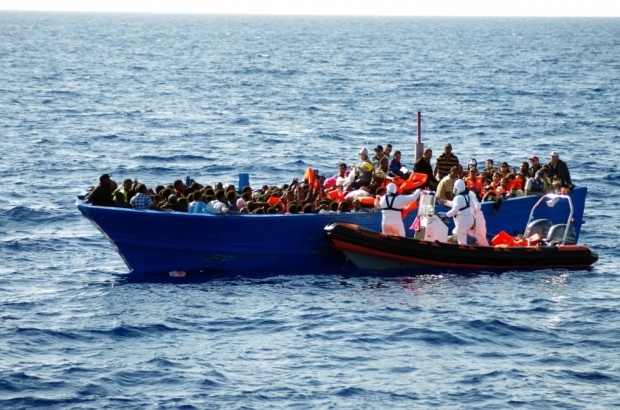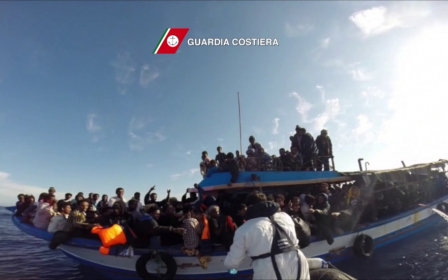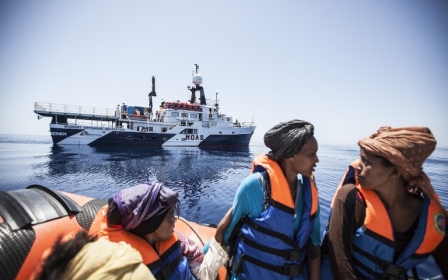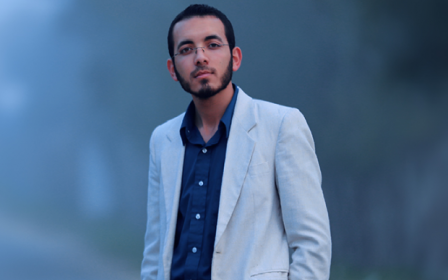EU boat-bombing plans will not solve migrant crisis, says Red Cross

UNITED NATIONS – A top Red Cross official has told Middle East Eye that European plans to launch military strikes on people-trafficking boats that cross the Mediterranean Sea are immoral and will not solve the refugee crisis.
Francesco Rocca, who runs the Red Cross in Italy and is vice president of the organisation's international arm, is visiting New York to persuade diplomats against passing a UN Security Resolution to rubber-stamp European military force in Libya.
“We must fight traffickers, who destroy lives and human dignity, but we must find a more comprehensive solution than just bombing bases and these little boats,” Rocca told MEE in an interview at the UN headquarters in Manhattan.
“European nations know this will not work. There are already other routes overland through Lebanon, Turkey, the Balkans and across the Aegean Sea. Closing one route is not enough; we must find a legal solution for people who deserve to be protected.”
EU foreign policy chief Federica Mogherini is due to brief the UN Security Council behind closed doors on Monday in a bid to secure approval for seizing boats used to traffic migrants across the Mediterranean from Libya.
Ship-bombing concerns
EU leaders agreed last month to “identify, capture and destroy vessels before they are used by traffickers”, and the 28-nation bloc wants UN authorisation for its operations.
Europeans on the 15-nation UN Security Council - France, Britain, Spain and Lithuania - have drafted a resolution allowing the EU to intervene on the high seas under Chapter VII of the UN Charter, which permits the use of force, but its unclear how it will be used.
And they will likely face opposition from Moscow, which can veto Security Council decisions. Russian diplomats were initially supportive of tough measures, but drew the line at approving the destruction of boats, according to Reuters.
Rocca, of the Red Cross, is not the only aid chief with concerns about ship-bombing. “Sunken boats can be replaced. Lost lives cannot. Saving lives should be our top priority,” William Lacy Swing, head of the International Organisation for Migration, told MEE.
The UN’s refugee agency, UNHCR, is also alarmed. During the launch of a report this week about the record-breaking 38 million people who were forced from their homes in 2014, Volker Türk, a UN refugee chief, said: “Despair drives people to take their chances and even risk dangerous boat journeys.”
European states face a surge in the refugees crossing the Mediterranean and overland via Turkey. Many are fleeing violence in Syria and Libya; others are escaping far-flung conflicts in Somalia, Nigeria and Congo.
The EU is mulling tough measures in Libya because the lack of government control means people-traffickers operate freely. Four years after the fall of Muammar Gaddafi, the country has descended into factional fighting under two rival governments.
The militia running Libya’s coastal capital Tripoli said it would “confront” any unilateral EU moves to attack people-traffickers. Mogherini said any action being considered to halt migrant flows should not be seen as an assault on the Libyan people.
Driven from home
According to Rocca, some 5,000 people are believed to have drowned in the Mediterranean these past 18 months, where ruthless trafficking gangs sail overcrowded rickety ships. This year alone, some 35,000 migrants have risked crossing, he said.
On Friday, Italian officials confirmed the discovery of a wreck of a 25-metre ship that capsized in the Strait of Sicily. Some 800 people drowned after it sank in April, with only about 50 survivors in one of the single deadliest episodes from the refugee flow.
“I have looked into the eyes of many of these people, who have told me their story. People fleeing violence and war in Somalia, a father trying to save his sons, a Nigerian mother looking for somewhere her daughter was safe from Boko Haram,” Rocca told MEE.
“These people don’t want to escape. They love their homes, their teachers, their schools and their friends. But these are terrible stories of people who have been driven from their homes by violence in Syria and other conflicts.”
Rocca also added his voice to support a pause in Saudi Arabia’s bombing campaign against Houthis in Yemen, where fighting and an airstrike campaign that began in March has sparked a refugee and humanitarian crisis.
Saudi officials announced plans for a five-day ceasefire to start on Tuesday, 12 May, but it hinges on Houthis backing a truce.
“In Yemen, there is no access for providing humanitarian support; the population desperately needs medical and food supplies,” Rocca told MEE. “Our colleagues are working round the clock there, but we need the parties to respect the agreements we have signed with them.”
He was even more downbeat about Syria, where fighting between government forces and various opposition groups has claimed more than 220,000 lives and displaced millions since it erupted out of peaceful anti-government protests in early 2011.
“The situation in Syria is completely out of control,” he told MEE. “Families have been forced to escape fighting only to have to flee time and time again.
“The scale of their suffering is almost beyond the human imagination. Providing aid there remains extremely difficult, often negotiating with several armed groups who have little respect for the Geneva Conventions.”
Middle East Eye propose une couverture et une analyse indépendantes et incomparables du Moyen-Orient, de l’Afrique du Nord et d’autres régions du monde. Pour en savoir plus sur la reprise de ce contenu et les frais qui s’appliquent, veuillez remplir ce formulaire [en anglais]. Pour en savoir plus sur MEE, cliquez ici [en anglais].




